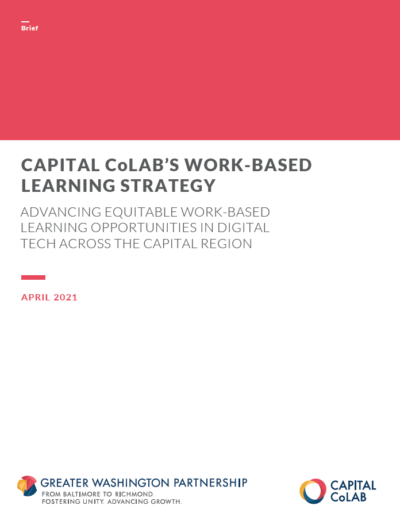Capital CoLAB’s Work-Based Learning Strategy
Publish Date: April 2021

 Download Issue Brief »
Download Issue Brief »
Despite the Capital Region’s position as a major tech hub with one of the nation’s most well-educated populations, education and economic opportunities are out of reach for too many residents. Addressing these inequities is not only a moral imperative, but an economic one: without expanding the way academic institutions and employers prepare and source talent, the region risks 60,000 digital tech and tech adjacent jobs going unfilled annually by 2025. The Greater Washington Partnership launched the Collaborative of Leaders in Academia and Business (CoLAB) to prepare more learners from more backgrounds for the in-demand, digital tech jobs of today and tomorrow. Through this work, CoLAB aims to build and scale educator-employer partnerships that expand learners’ access to industry-validated, digital tech competencies. With its network of 18 major employers, 27 higher education institutions, and five K-12 school systems, CoLAB’s vision is that the Capital Region can have the most diverse digital tech workforce in the country.
Bridging coursework and professional experiences through work-based learning will help the Capital Region meet its demand for tech talent and expand career pathways to more diverse students, including racial and ethnic minorities and women.
The Capital Region is a major tech hub with one of the nation’s most well-educated populations, but education and economic opportunities are out of reach for too many residents. The COVID-19 pandemic has exacerbated the socio-economic inequities that already existed in society, and the shift to virtual work and school has highlighted the digital divide within many communities. However, Capital Region employers have an opportunity to leverage the virtual environment to engage their future workforce in new ways. Work-based learning offers a way for employers to branch into schools and connect with talent pools that were not traditionally part of their standard workforce development and recruitments strategies.
Work-based learning (also called WBL) is an educational activity comprising meaningful workplace experiences that facilitate academic, technical, and employability skill development to support entry into or advancement along a career pathway. While employers historically hosted work-based learning programs onsite, the virtual environment provides a broader platform for them to reach more learners as they develop job-ready skills.
In 2020, Capital CoLAB—the talent and skills division of Greater Washington Partnership — enlisted the help of Higher Ed Insight to conduct a landscape analysis of digital tech work-based learning in the Capital Region.
HEI sought to do two things: 1) understand practices that increased representation of learners among populations that have been historically excluded from digital tech, and 2) identify strategies that contribute to equitable WBL opportunities and outcomes. This landscape analysis set the stage for how CoLAB will support work-based learning in the Capital Region over the next two years.
CoLAB will focus on the following goals to advance equitable work-based learning opportunities in digital tech across the Capital Region:
As one component of our vision to engage 45,000 students and adult learners — with at least 50 percent from underrepresented backgrounds — Capital CoLAB’s Work-Based Learning Strategy outlines how CoLAB will pursue each of its WBL goals over the next two years.